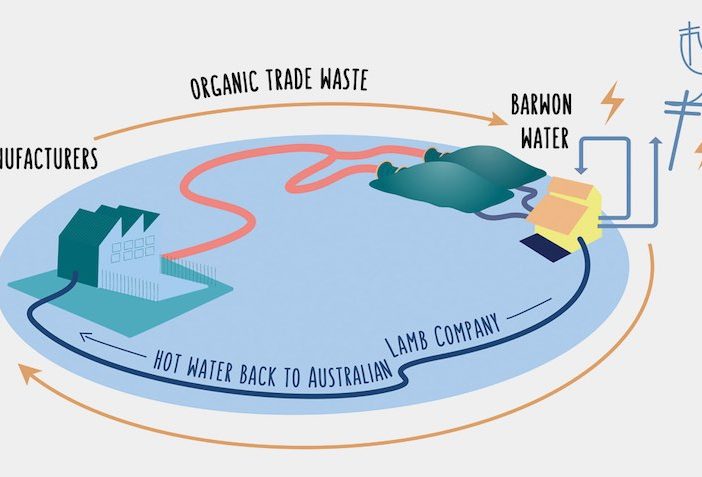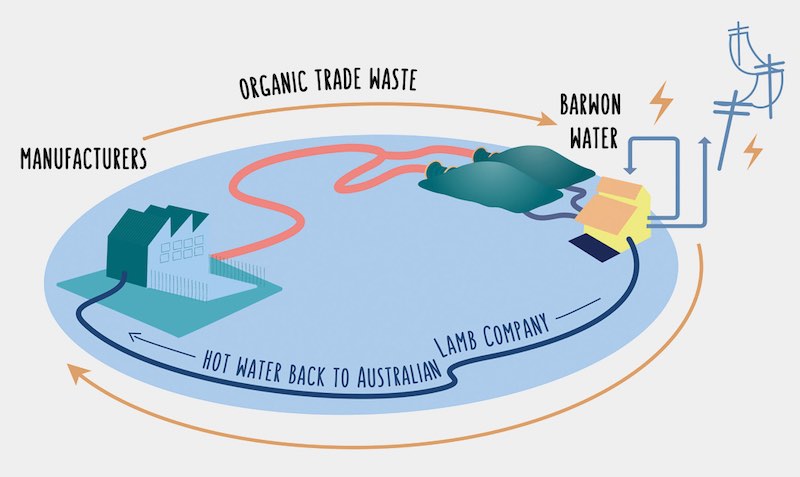

An “Australian-first” Renewable Organics Network that will use reclaimed organic waste to produce electricity, hot water, and soil improver is under construction in Victoria’s south-west.
The project, which received state government support in 2018, is being delivered by Barwon Water in partnership with the five Geelong Region Alliance (G21) councils, the Australian Lamb Company and Bulla Dairy Foods.
The Colac network – the first of two such facilities planned by Barwon Water – will use high-strength organic waste from Australian Lamb Company and Bulla Dairy Foods to produce renewable electricity and hot water.
The project is expected to achieve a net production of 5.5 gigawatt-hours of renewable electricity each year – enough to power around 1,000 homes – around half of which will be used “behind-the-meter” to take the Colac Water Reclamation Plant “off the grid.”
The remaining renewable electricity will be exported into the grid, while renewable hot water also generated by the project will be supplied to the Australian Lamb Company via an innovative pipeline – a measure that is expected to offset ALC’s natural gas consumption by 21.4 terajoules a year.
Overall, says Barwon Water, the generation of this dispatchable renewable energy in the form of hot water and electricity will result in a reduction in carbon emissions of around 6,300 tonnes each year.
Victoria’s minister for water, Lisa Neville, said last week that the Colac facility and another under development for the greater Geelong area would create more than 80 new jobs, while also creating a circular economy for the region’s organic waste and reducing landfill and water costs for councils.
“We know the impact climate change is having on inflows to our water storages and the health of our waterways, it’s never been more important to deliver creative solutions to reduce greenhouse gas emissions,” Neville said.
“We want our water corporations and the whole sector to help Victoria adapt to climate change – ensuring we continue to support jobs, liveable communities and a healthy environment.”
G21 CEO, Elaine Carbines AM, described the project as a ‘win-win’ – for the environment and for business.
“As the region’s population grows rapidly, innovation and resourcefulness are becoming increasingly important. Reducing greenhouse gas emissions generated by organics going to landfill is great for the local environment.”
Colac Otway Shire Mayor Jason Schram said that the Renewable Organics Networks had great potential beyond the Geelong region scheme.
“This project provides a massive boost to our industries, our community and our environment, and this stage of the network could be just the beginning,” he said in a statement last week.
“There is potential for this initiative to be rolled out across other local industries and Council has signed an MoU to be part of this innovative project that could result in Council saving on green waste disposal costs and accessing cheaper electricity in the future.
“Colac Otway Shire looks forward to continuing to forge strong partnerships with our local businesses and industries, regional councils and external agencies,” he said.

Sophie is editor of One Step Off The Grid and deputy editor of its sister site, Renew Economy. Sophie has been writing about clean energy for more than a decade.



